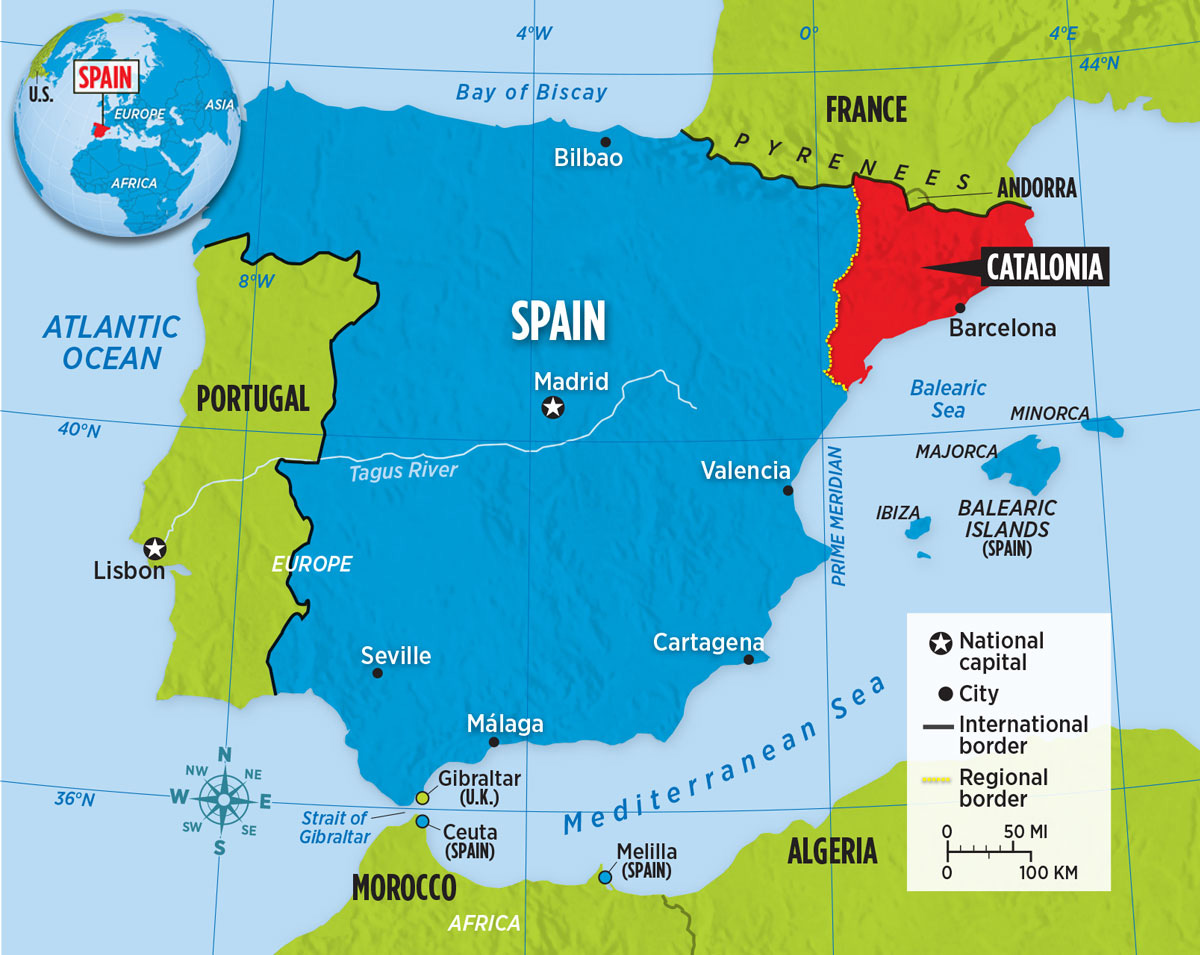
People in Catalonia march in support of independence on October 3.
Standoff in Spain
The Spanish region of Catalonia recently voted to become an independent country. What could that mean for the rest of Europe— and the United States?
Is Spain headed for the breakup of the century? Last month, people in the Spanish region of Catalonia voted to
The vote, which the Spanish government has declared illegal and unconstitutional, set off weeks of chaos and confusion. On the day of the
“Today the Spanish state wrote another shameful page in its history with Catalonia,” said Carles Puigdemont, Catalonia’s leader.
According to Catalan officials, 90 percent of voters backed independence. But turnout was relatively low: Just 43 percent of eligible voters—about 2.3 million people—cast ballots. (Actual vote totals are unclear because Spanish police seized a number of ballot boxes.) Experts say many Catalans who oppose independence likely
In recent weeks, hundreds of thousands of people across Spain have taken to the streets in massive demonstrations—some calling for Catalan independence, others for unity.
“Never have Catalonia and Spain endured a fracture like [this].”
Those who favor secession say Catalonia, a wealthy region in northeast Spain, would be better off on its own. They say the Spanish government has too much control over their affairs. But other Catalans and Spain’s leaders worry that the region—and Spain as a whole—would suffer economically if it were to become independent.
The stakes are incredibly high. Catalonia is a key industrial center that accounts for one-fifth of the Spanish economy. Its regional capital, Barcelona, is a major tourist destination that attracts 32 million visitors a year and brings in billions of dollars annually. Catalonia’s withdrawal from Spain would have huge implications for the country as well as the rest of Europe—and even the United States, experts say.
While it’s unclear what will happen next, tensions have undoubtedly reached a boiling point, says Spain’s deputy prime minister, Soraya Sáenz de Santamaría: “Never have Catalonia and Spain endured a fracture like [this].”
Centuries at Odds
Catalonia is one of Spain’s 17

Catalonia recently voted to leave Spain. This cartoon uses bullfighting—long associated with Spain—to symbolize the country’s opposition to Catalan independence and the violent clashes between Spanish police and peaceful protesters.

Experts say the modern fight for Catalan independence gained strength in 1975, after the death of Spain’s dictator, Francisco Franco. During his nearly 40-year reign, Franco took away much of Catalonia’s autonomy and suppressed the region’s culture. He outlawed the Catalan language, forced parents to choose Spanish names for their children, and executed or imprisoned thousands of people in an attempt to clamp down on opponents.
Over time, the oppression led to a renewed sense of Catalan nationalism (or patriotism) and intensified Catalans’ desire for independence. In 1978, the Spanish government responded by granting the region limited self-governing powers. For example, Catalonia oversees its own police force, schools, and hospitals. The Spanish government, meanwhile, controls taxes, foreign affairs, infrastructure, and other matters.
Stay or Go?
In addition to feelings of nationalism, many Catalans who support independence say the region gives too much money to the central government. According to some estimates, Catalonia pays about 20 percent of Spain’s taxes, some of which are used to fund development projects in poorer parts of the country.
Supporters of independence also note that Catalonia is a major industrial center. They say the region’s strong economy is a sign that it would be viable as an independent country.
Guillem Carbonell Vidal, 18, is one of many young activists excited by the prospect of independence. “We have been waiting for this moment for 300 years,” he told reporters. “I will be able to live the way I want. We will be able to build a new future.”
Catalonia has a distinct language, culture, and history.
But those who oppose independence insist that Catalonia is better off as part of Spain. According to experts, it’s unlikely that an independent Catalonia would be able to join the European Union (E.U.), the political and economic partnership of 28 nations across Europe. Without E.U. membership, it would be harder for Catalonia to trade with other countries, which could lead to the loss of jobs.
Several companies based in Catalonia, including major banks, have already announced plans to move their headquarters to different parts of Spain to ensure that they remain in the E.U.
Alejandro Marcos, 44, and other Catalans who oppose secession say their views are being overshadowed by those who favor independence.
“We have perhaps been silent too long,” he told reporters. “It seems that the one who yells the most wins the argument. So we have to raise our voices and say loud and clear that we do not want independence.”
A Domino Effect?
Since the October 1 vote, the situation in Spain has become increasingly tense. Both Catalonia’s regional government and Spain’s prime minister, Mariano Rajoy, have refused to back down. At press time, the Spanish government seemed to be moving to suspend Catalonia’s autonomy, and the country appeared headed for a major confrontation.
Spain’s King Felipe VI has criticized Catalan leaders for what he calls their “disloyalty” and “irresponsible conduct.”
U.S. President Donald Trump and leaders of the E.U. also oppose Catalan secession. They fear that it could inspire other independence movements across the continent and threaten the strength of their alliance.
Europe is already dealing with a number of challenges: the decision by the United Kingdom to leave the E.U. (known as Brexit), high unemployment, and the record influx of refugees from the Middle East and Africa. If Catalonia were to leave Spain, a key member of the E.U., it could create a new crisis for the continent.
“The consequences could be devastating,” says Federiga Bindi, an expert on international relations at Johns Hopkins University in Maryland.
After weeks of unrest, European lawmakers continue to urge both sides to work out a peaceful resolution.
“We are all part of the same community, and we need to go forward together,” Puigdemont says. “The only way forward is democracy and peace.”
CORE QUESTION: What might be some pros and cons of Catalan independence?
Catalonia vs. Spain
Catalans are fiercely proud of their region and heritage. Here are a few ways Catalonia differs from Spain.


CATALONIA
Cultural Symbol: Castells
Primary Language: Catalan
Top Soccer Team: FC Barcelona
———————————
SPAIN
Cultural Symbol: Bullfighting
Primary Language: Spanish
Top Soccer Team: Real Madrid




